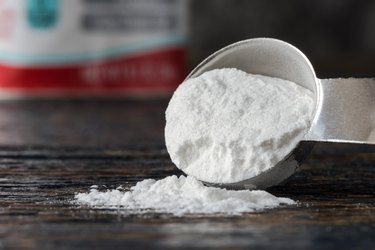
You're ready to start baking and your recipe calls for 1/2 teaspoon of baking powder, but it turns out the only baking powder you have on hand is expired baking powder. Don't worry, though, because there's a simple test to see if it's still good enough to use.
Tip
Using expired baking powder, when baking, may result in your baked cake, or dough, not rising. It's best to use baking powder, a baking soda substitute, by its expiration date, in order to prevent this from happening.
Video of the Day
Baking Soda vs. Baking Powder
One-half teaspoon of Arm & Hammer's pure baking soda contains 600 milligrams, or 25 percent of the daily value, of sodium. According to North Carolina State University (NCU), baking soda is made from just a single ingredient: sodium bicarbonate.
Video of the Day
Because baking soda is basic in nature, it reacts instantly with acids present in baked goods, like yogurt and buttermilk. This chemical reaction releases carbon dioxide, which causes the dough or batter to leaven.
A common baking soda substitute, baking powder offers an extended period for this reaction. While it still contains sodium bicarbonate, it also has two acids, explains NCU. These comprise both monocalcium phosphate and either sodium acid pyrophosphate or sodium aluminum sulfate. They all delay the ability of the baked goods to rise until they're placed in the oven.
This is why, in addition to sodium, a serving of baking powder contains calcium. According to the USDA, 1/2 teaspoon of pure baking powder offers 200 milligrams, or 8 percent of the daily value, of sodium.
It also provides 116 milligrams, or 9 percent of the daily value, of calcium. These two minerals are considered to be major minerals that the body requires for strong bones, muscle contraction and nervous system function.
Expired Baking Powder Effects
The University of Florida's Institute of Food and Agricultural Sciences states that expiration dates indicate the last date to consume a particular product before its quality diminishes. So while using expired baking powder after the date of expiry is perfectly safe, it may not be as effective.
According to Michigan State University Extension, it's best to use baking powder before its date of expiry. Expired baking powder loses its potency after its use-by date, usually 18 to 24 months after manufacture. The only danger of using expired baking soda or baking powder is its inability to properly rise, resulting in baked goods that are flat and dense.
To test whether expired baking powder is still fresh, you can mix a teaspoon of baking powder into 1/3 cup of warm water, explains Iowa State University Extension and Outreach. A bubbling mixture indicates that the expired baking powder is still good and will cause the dough to rise in the oven.
Michigan State University Extension explains that while baking powder can last indefinitely, contamination and exposure to moisture can significantly affect its shelf life. Moisture chemically reacts with baking powder and makes it ineffective for use in baking.
- USDA: “Pure Baking Powder”
- USDA: “Arm & Hammer Pure Baking Soda”
- North Carolina State University: "The Difference Between Baking Soda and Baking Powder"
- Michigan State University Extension: "Rising Ingredients: Baking Powder and Baking Soda"
- Iowa State University Extension and Outreach: “Holiday Baking Ingredients"
- University of Florida Institute of Food and Agricultural Sciences: "Dates on Food Packages: What Do They Mean?”